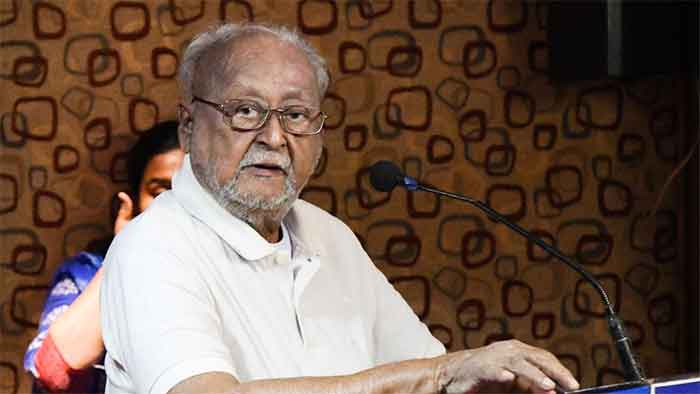
When a poet passes on, the quiver, the flutter of the soul is felt across by those who have revelled in the words and expressions in the poetry, have been moved by the feelings threaded in verses or have communed with the partial or entire oeuvre of the poet. Jayanta Mahapatra’s demise is being bruited abroad with a mix of disbelief and that definitive prickle at passing of an era. Yes, he was a fine poet, but even more. He was a courageous curator of culture of poetry – writing, reading, criticism and discussions.
As a poet, Jayanta Mahapatra has been extremely well-known among the readers of English Poetry for his works rooted in Indian Experience. His poems uncovered the brutish realities underneath the veneer of normalcy of what is considered as innocence, piety or even traditions. He created vivid images in his short poems and sustained them throughout his oeuvre, to open a compelling world for his readers. He also emplaced conscious onlookers, experiencing figures in his poetry, whom the readers could identify with (or not) but could not ignore, unhear or overlook. That lent an ever present social consciousness in his poems. Laced with irony, his word images were sharp strokes of observations, musings, contemplative thoughts. As a bilingual poet, he revelled in English and Odia poetry, but also wrote short stories, essays and memoirs. He founded and edited a literary journal in the late nineteen seventies, which became a bright beacon for readers of poetry and creative writing.
As the editor of Chandrabhaga, he facilitated several poets, including myself, to find their individual poetic voices. As a fledgling poet, filled with the pluck and innocence of a greenhorn, to have received his feedback in hand-written letters and publication of a poem in his prestigious journal was a high point. I sent him my works in English as well as in Hindi, and he was more inclined towards Hindi, encouraging me to write in my mother tongue, dilating upon how the interiority was alive and impassioned in it. To illustrate the point, he cited his own work in Odia, translated it in English to discuss the loss of cultural meaning, vital to the feelings enthused therein. It is his painstaking feedback to an unknown enthusiast from a small town in Haryana, which made me deeply aware of the culture of poetry and ensconced me in the community of readership. It emboldened me.
Jayanta Mahapatra was unafraid to voice his opinions and convictions, even if these were unpopular or not in vogue. He was recognised across the country and beyond for his contributions and feted with numerous literary awards, including the Sahitya Akademi Award, Jacob Glatstein Memorial Award, and Allen Tate Poetry Prize from The Sewanee Review, to name a few. The wide readership, acknowledgement he received bears evidence to the numerous minds he ignited and moved with his works. The literary community is mourning his demise, celebrating his works, applauding his words, acknowledging the flutter in their souls.
Surbhi Goel has published poetry in Indian Literature, Chandrabhaga, dialog, MuseIndia (in English) and Harigandha@Haryana Sahitya Akademi (in Hindi). She is engaged in Film Studies and teaches at Panjab University, Chandigarh














































